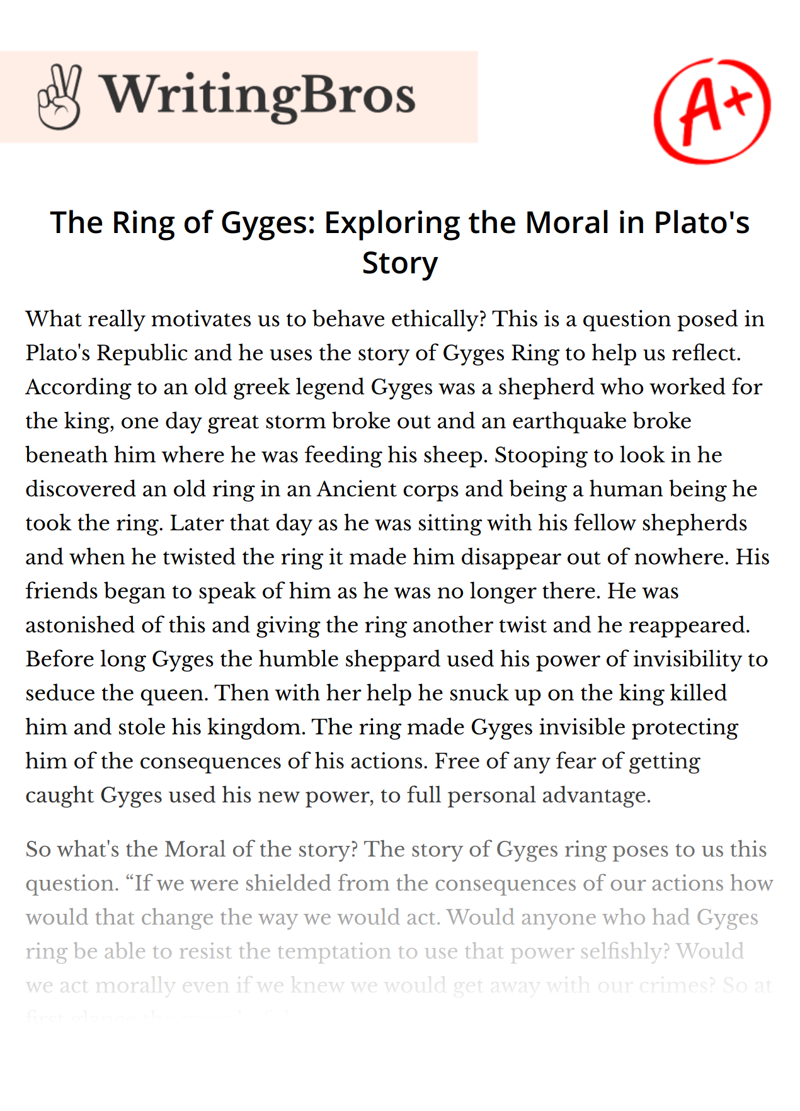The Ring of Gyges: Exploring the Moral in Plato's Story

What really motivates us to behave ethically? This is a question posed in Plato's Republic and he uses the story of Gyges Ring to help us reflect. According to an old greek legend Gyges was a shepherd who worked for the king, one day great storm broke out and an earthquake broke beneath him where he was feeding his sheep. Stooping to look in he discovered an old ring in an Ancient corps and being a human being he took the ring. Later that day as he was sitting with his fellow shepherds and when he twisted the ring it made him disappear out of nowhere. His friends began to speak of him as he was no longer there. He was astonished of this and giving the ring another twist and he reappeared. Before long Gyges the humble sheppard used his power of invisibility to seduce the queen. Then with her help he snuck up on the king killed him and stole his kingdom. The ring made Gyges invisible protecting him of the consequences of his actions. Free of any fear of getting caught Gyges used his new power, to full personal advantage.
So what's the Moral of the story? The story of Gyges ring poses to us this question. “If we were shielded from the consequences of our actions how would that change the way we would act. Would anyone who had Gyges ring be able to resist the temptation to use that power selfishly? Would we act morally even if we knew we would get away with our crimes? So at first glance the moral of the story seems to be, that deep down we believe acting unjustly is far more profitable satisfying and fun than being just. The story seems to suggest we all tend to pursue our own self interest and that we would all tend to pursue our own self-interest and that we would all be willing to seduce and betray if we thought we would all get away with it. In Platos dialog those who believe this say that the wisest among us wish to be but not seem unjust. So why do we act ethically? They would say we are basically afraid of getting caught.
We all want to do bad stuff but we don't want to be caught doing it so what keeps us from acting unethically is not that we believe that seducing and betraying will ruin us but that we are afraid of developing a bad reputation, or be otherwise punished if we were getting caught. If we can hide our faces like gyges used to turn the face of his ring inward we would gladly pursue a life of crime and enjoy the benefits without a second thought. But Plato did not believe this. He believed people chose to be good simply for the sake of being good and the reward that brings and so he offered a different moral to the story, one that is diametrically opposed to this view that a bad person could be as happy or perhaps even happier than a good person. To refute those who said that Plato tried to prove the we can never be truly happy unless we're living a virtuous life. Plato argued that the purest and most secure form of human happiness consists in tranquility or peace of mind or spiritual harmony or perhaps a good conscience. This Plato said is a joy that cannot easily be rested from us. Plato suggested that injustice leads to a life of inner turmoil and chaos, if the just life leads a harmony to the soul whereas the unjust life leads to disharmony and if the harmony of the soul is a description of true happiness then plato's argument is good. Here's is Platos conclusion. “Can it profit anyone to acquire much gold unjustly if, by doing so, he enslaves the best part of himself to the most vicious? If he received his prize by enslaving his son or daughter to savage and evil men, it wouldn't profit him at any price.”
Cite this Essay
To export a reference to this article please select a referencing style below

